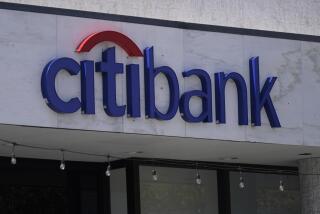Judge May Fine Sears Up to $100 Million
- Share via
Sears, Roebuck & Co. could be fined as much as $100 million by a federal judge in a new challenge to the way the retailer collected credit card debt in California.
Sears has been ordered to appear Wednesday at a U.S. Bankruptcy Court hearing, where it also faces limits on efforts to collect debts from bankrupt California consumers.
The Hoffman Estates, Ill.-based retailer has agreed to pay at least $178 million in a nationwide settlement stemming from its admission in April that it improperly collected money from an estimated 250,000 bankrupt credit card customers. With federal and state regulators stepping up their scrutiny of the consumer-lending industry, bankruptcy judges are also getting tougher with lenders such as Sears, bankruptcy experts said.
“That is a number the judge threw out there to get their attention,” said Kenneth Klee, a UCLA bankruptcy law professor.
The California dispute involves agreements, known as reaffirmations, that bankrupt consumers signed promising to repay their credit card debts to Sears. In an Aug. 22 order calling for the hearing, U.S. Bankruptcy Judge Samuel Bufford in Los Angeles wrote that Sears misrepresented in two agreements that it had the right to repossess goods purchased by the debtors. Sears also misrepresented that borrowers had to pay “a substantial amount” of the debt to keep the purchased goods, according to the order.
Sears also failed to disclose the total amount to be paid by the two debtors and some terms of the repayment plan, Bufford wrote.
In addition to the fine, the judge wrote that he is considering a ban on Sears’ use of reaffirmation agreements in the state. Bufford declined to comment.
Sears denied wrongdoing.
“There’s no evidence before the court to support a finding that Sears violated the law,” said Paula Davis, a spokeswoman for Sears. The retailer asked that the hearing be postponed.
The company said in a court filing that it was puzzled by the judge’s order and didn’t understand why he was focusing on such “sweeping-type issues.”
Sears typically claims the right to repossess goods purchased with its credit card if borrowers fail to make payments. The retailer said it tells consumers in the credit card application and on all charge receipts that it has this right.
Sears’ shares fell 56 cents to close at $56.69 on the New York Stock Exchange.
The judge’s dispute with Sears involves a number of issues, bankruptcy lawyers said.
For one, lenders often don’t have the proper legal records to back up their claims. Even if they do, they rarely want to repossess used household goods and appliances because of the cost, said Gary Klein, an attorney for Boston-based National Consumer Law Center, a consumer advocacy group.
“The whole question in these transactions is fairly bogus,” Klein said.
In his order, Bufford wrote that Sears “failed to make other disclosures” required by California law in the agreements made with the debtors. Among other things, Sears didn’t tell borrowers the interest rate on their remaining debt and the number of monthly payments, according to the order.
That could violate California law, attorneys in the state said.
More to Read
Inside the business of entertainment
The Wide Shot brings you news, analysis and insights on everything from streaming wars to production — and what it all means for the future.
You may occasionally receive promotional content from the Los Angeles Times.










